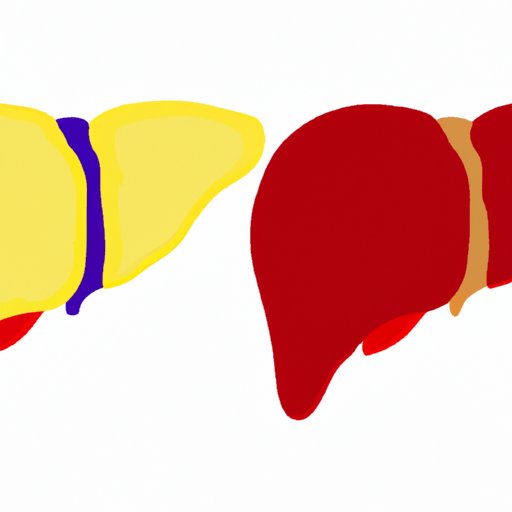
Introduction
The liver is one of the most important organs in the human body, carrying out numerous essential functions that keep us healthy and alive. Our liver is responsible for everything from digesting food and detoxifying our blood to producing essential proteins and hormones.
In this article, we will explore the role of the liver in the body, what happens when the liver stops working properly, and the consequences of living without this vital organ. We’ll also provide tips for maintaining a healthy liver and discuss the life-saving solution of liver transplant.
The Role of the Liver in the Body and Its Functions
Located in the upper right-hand side of the abdomen, the liver is a large, reddish-brown organ that performs a wide range of important functions in the body. The liver is divided into two main sections, or lobes, and is connected to the gallbladder, pancreas, and intestines.
One of the primary functions of the liver is to aid in the digestion of food. The liver produces bile, a substance that helps break down fats and absorb fat-soluble vitamins. Without healthy bile production, individuals may experience digestive problems such as diarrhea and nutrient deficiencies.
The liver also acts as a detoxifying machine, filtering blood from harmful substances such as alcohol, drugs, and toxins. It detoxifies them through a process called biotransformation. The liver also aids in regulating glucose levels in the body by storing glucose as glycogen and releasing it into the bloodstream when energy is needed.
In addition to these functions, the liver also produces essential proteins and hormones such as albumin, which helps transport nutrients throughout the body, and thrombopoietin, which stimulates the production of blood platelets. Without these proteins, blood clotting disorders and fluid build-up in the body may occur.
What Happens When the Liver Stops Working: Understanding Liver Failure
Liver failure occurs when the liver is no longer able to perform its essential functions. This can happen due to chronic diseases such as cirrhosis or hepatitis, prolonged untreated alcoholism, or as a side effect of certain medications.
Common symptoms of liver failure include jaundice, in which the skin and eyes become yellow, fatigue and weakness, confusion or disorientation, and swelling in the abdomen and legs.
Treatment options for liver failure include medication to manage symptoms and lifestyle changes such as abstaining from alcohol and eating a healthy diet. In severe cases, a liver transplant may be necessary. During a liver transplant, the damaged liver is replaced with a healthy liver from a donor. It can take several months for the transplanted liver to begin functioning properly, but success rates in liver transplants are high.
The Consequences of Living Without a Liver: Is It Possible?
The liver plays an integral role in numerous processes in the body, and living without it is not possible. While other organs can be substituted or eliminated, the liver is irreplaceable.
Alternative treatments for liver failure include hemodialysis, a procedure that filters the blood outside of the body, and artificial liver support systems, which serve as a temporary liver for patients waiting for a liver transplant.
The Importance of Liver Health and How to Take Care of It
While liver failure can be caused by a variety of factors, there are steps that individuals can take to maintain a healthy liver. Eating a balanced diet low in sugar, fat, and processed foods can reduce the risk of liver disease and improve liver function. Exercising regularly can also help improve liver health, as can avoiding harmful substances such as tobacco and excessive alcohol consumption.
It is important to have regular liver function screenings, particularly for those at high risk of liver disease, including individuals with chronic hepatitis, a family history of liver disease, or a history of alcohol abuse. Early detection of liver problems can help prevent liver damage and the development of serious liver disease.
Liver Transplant: A Life-Saving Solution for Liver Failure
Liver transplant is a viable solution for individuals with end-stage liver disease or liver failure. It involves removing the damaged liver and replacing it with a healthy liver from a donor, through a surgical procedure. While there is always some risk involved in any surgical procedure, liver transplants have a high success rate, with most patients recovering well with an improved quality of life in the long run.
Eligibility criteria for liver transplant include evidence of significant liver disease, adequate support for the postoperative process, and a commitment to following postoperative management. Donors for liver transplant may come from a cadaveric or a living donor, including relatives or even unrelated persons.
In conclusion, liver health is critical for overall body and organ functioning. If you notice signs of liver disease such as jaundice, fatigue, or abdominal swelling, it is essential to consult a healthcare professional who can guide you through the treatment process. Prioritizing liver health through diet, exercise, and healthy lifestyle choices can help prevent liver damage and keep this important organ functioning at its best.





